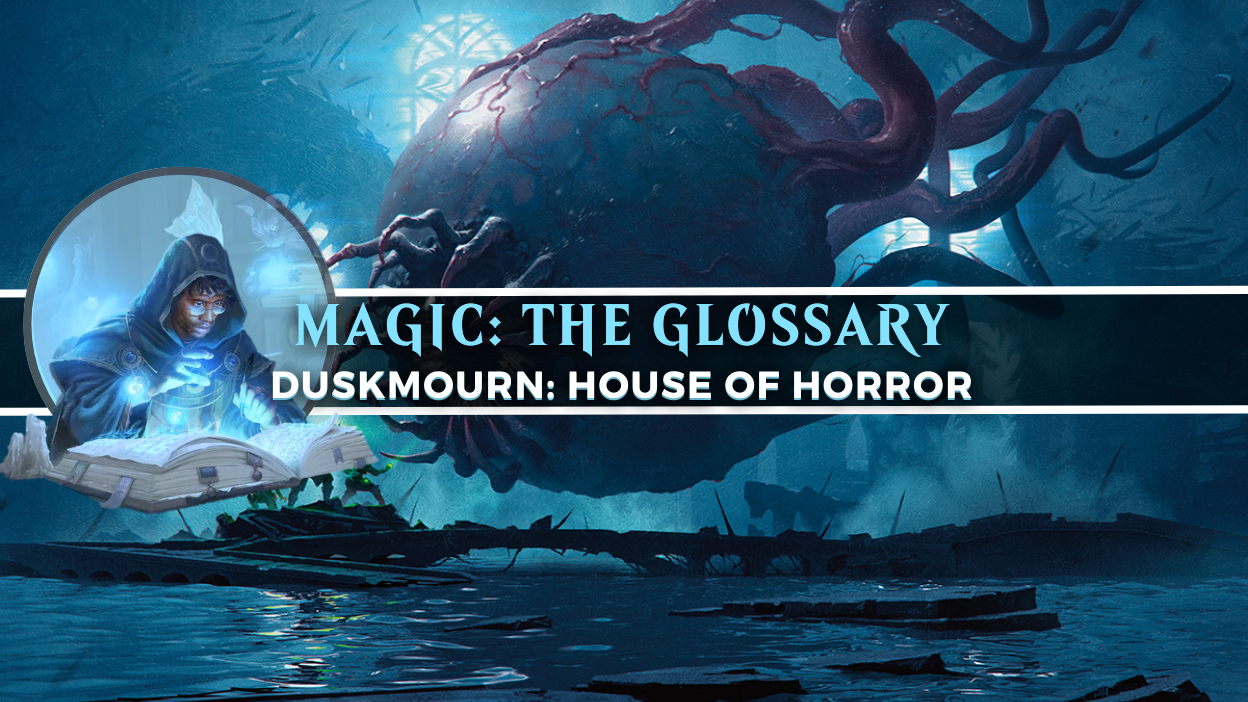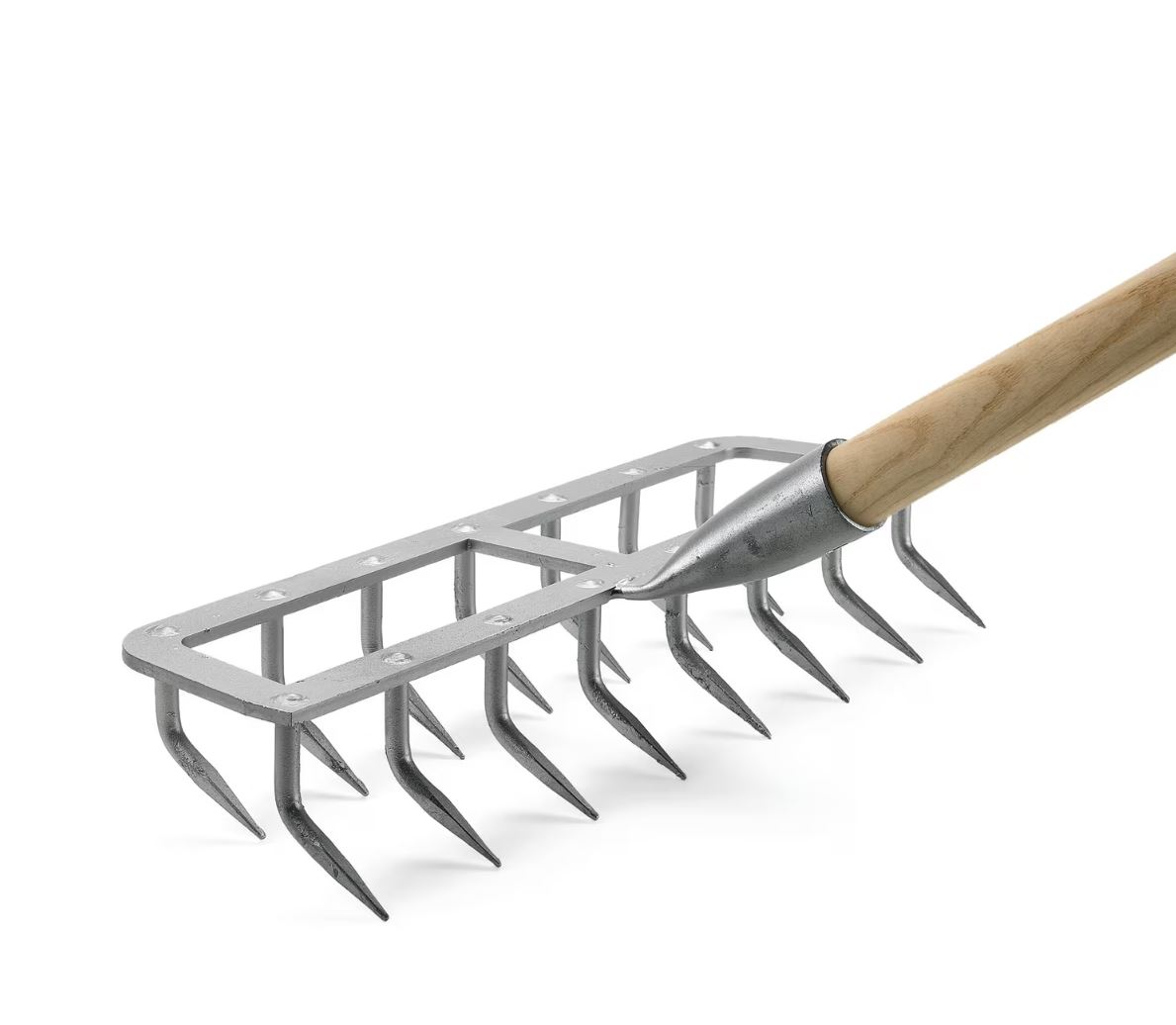Magic: the Glossary - Duskmourn: House of Horrors

Abhorrent Oculus by Bryan Sola
"Valgavoth has eyes everywhere. And I don't mean that figuratively."
The English language is pretty neat. I'm typing words in my office alone, and these words will convey meaning to you, whoever you are, reading this wherever you may be. Maybe you're on public transit. Maybe you're in the bathroom. Maybe you're in the gallery at a murder trial. I simply cannot know (unless you tell me), but these words still find you.
I could say anything I want. Emerald. Professional wrestling. Dark chocolate. Diplodocus. I dare you not to imagine each of those in your mind's eye. But what happens if I use a word that the majority of readers might not know? Jentacular? Peristeronic? Cattywampus?
If you don't know these words, you've got two options. You can either look them up, or you can let them bounce off your face, land in your lap, brush them to the floor and move on with your day. And I'll be honest with you, you can get through life in the English-speaking world just fine without knowing that "jentacular" describes something pertaining to breakfast, or that "peristeronic" means something with pigeon-like qualities. And "cattywampus," in addition to being fun to say, simply means askew or vaguely adjacent to. So I guess you actually have three options, with the third to simply wait until I'm overcome with the need to let you know how smart with words I am and give you the definitions myself.
Designers of Magic cards are pretty smart with words, too, and they, like me, exhibit that drive to make sure everyone knows it. So today, it's time to look at newly released Duskmourn through the lens of an amateur lexicographer and tackle any lesser-known words found in the big ol' spooky house.
And if you want to catch up with all the latest in word entertainment, check out the Bloomburrow edition of Magic: the Glossary.
Redress Fate
You would be forgiven for assuming that "redress" means to put your clothes back on, but that's not the definition in this context. To "redress" is to "fix" or "set back on the right path."
So fate's a little cattywampus, and when we redress it we correct that misalignment.
Abhorrent Oculus
We're starting off cards from Duskmourn proper with a twofer, as both of these words aren't featured in everyday conversation all that frequently. However, coupled with the art, most players can probably infer their meanings.
The first part, "abhorrent," is a more literary synonym for "gross." In other words, "ew." Or, if you'd rather, "ick." Specifically, use of the word "abhorrent" implies both a physical repulsion and an emotional one as well.
As for "oculus," it's actually an architectural term that's been co-opted. If we're being pedantic, an "oculus" is a term for a circular window, which actually better aligns with the card's showcase version
Paranormal Analyst
A "paranormal analyst" is someone who trespasses on private property to goad shadows with bizarre taunting, while a hesitant friend records on a cameraphone in portrait orientation.
Dashing Bloodsucker
I'm including this one here because the word "dashing" is actually pretty interesting. Typically, it's an adjective used to describe someone whose confidence is attractive, but more broadly it has come to be used to describe anyone exuding style and wit.
However, "dashing" has multiple meanings reliant on context. For the card, we're using the aforementioned definition, but "dashing" can also be a verb to describe quick traversing movement, or what one might do through the snow in a one-horse open sleigh. It can also mean to violently strike together two objects, like what might happen if you jump off a cliff.
Originally, the use of the card's version of the term began in the 1700s, to mean "a showy appearance." It wasn't a compliment, like it is today.
Innocuous Rat
Often, when two words sound similar to the ear and mean vaguely similar things, their definitions will become intertwined. Such is the case with "innocuous," which often is used interchangably with "innocent." They're two different words though, and this particular card illustrates that fact very well.
Strictly, "innocuous" means "unlikely to cause offense or injury." But at its root, "innocuous" actually began with the opposite definition, as in Latin "innocuus" mean "to harm." And if you're connecting in your mind the term "innocuous" with "inoculation," a.k.a. vaccination, don't. They're two different words again, with the latter actually being derived from our friend above, "oculus."
However, in a literary context, this little rodent isn't unlikely to cause offense or injury at all. And that's the implied meaning of the term "innocuous." Sometimes, words are used to provide the reader a reason to infer the opposite definition, and the term "innocuous" is often used for exactly that. Something that is "innocuous" only seems harmless, but is in fact very much harmful. Words are neat.
Miasma Demon
Generally, "miasma" (sounding identical to when I'm complaining of "my asthma") is any heavy vapor that drains, corrupts or otherwise harms anything with which it comes into contact. So basically, a mean fog. "Miasma" originally had a stricter meaning of vapor that causes illness specifically, but today it just means any kind of poisonous air.
There's also a more metaphorical application of the term, in which "miasma" means any negative, pervasive influence on one's circumstances. Like, after eating my third burrito, I might say "man, I wish I wasn't embroiled in the miasma of my own poor decision-making."
Whether the demon on this card exudes sickly vapor, or tricks me into going to Taco Bell, that's up to interpretation.
Osseous Sticktwister
We know from the last time we did one of these Magic: the Glossary articles that "osseous" means bone-like. So this particular scarecrow seems to be made of bones, which to be fair can also describe a skeleton.
It's the second word in the name, though, that really resonates with me (possibly NSFW).
Popular Egotist
And "egotist" is simply someone who can be described as egotistical. Essentially, it's someone who talks about themself too much or has an over-inflated sense of self-importance. It can go along with having excess pride, but in general an "egotist" is someone for whom pride is less important, because their baseline opinion of themself is so high, for what a normal person would be prideful, an egotist calls a Tuesday. I'm sure we all know someone who fits this description. And if you don't, maybe it's you.
Now that we have two Egotists
Sporogenic Infection
I waffled about whether to include this one, as "sporogenic" is a borderline made-up word. But really, aren't all words made-up? If enough people take "sporogenic" to be the adjective form of "sporogenesis," then who am I to stand in the way of the inexorable march of functional linguistics?
And "sporogenesis," by the way, just means anything that creates spores or reproduces via spores. In the card's context, that's whatever Last of Us nightmare is happening in the art, but in the real world it's most often associated with fungi, mosses and ferns. And there are actually a bunch of different kinds of spores, too, for different purposes, but I'll leave you to learning about that yourself.
Anthropede
This, unlike the last one, is most certainly a fictional term created by the designers. But it's interesting in the sense that while it's invented, it's done so using real bits and bobs. Specifically, we've got "anthro-" which means "human-like" in appearance or construction, and we've got "-pede," meaning "having a foot." You know, like how "centipede" means "100 feet," or how "pedestrian" means "someone who travels on foot."
Weirdly, that's not what we get in the art. Our antropede seems not to have human feet, but human hands.
Balustrade Wurm
If we were doing Magic: the Glossary back in the Gatecrash times of 2013
If you want to get granular about it, a "balustrade" is the whole shebang, but there are actually two distinct parts: there's the balusters, which are the vertical up-and-down parts, and the rail, which is the horizontal part that connects the balusters at their tops.
Slavering Branchsnapper
Here's one that illustrates the importance of context. To "slaver" is to drool or slobber. It's what St. Bernards do, or human babies I guess, though the word "slaver" is usually reserved for feral animals who are drooling in anticipation of a meal. "Slaver" as a noun is very much not the same word, despite being pronounced and spelled the same.
Valgavoth, Harrower of Souls
Magic has over the years provided us with examples of both definitions of the word "harrow." We've got, well, Harrow, which is a verb to mean using a harrow to work a field. What's a harrow? This thing:

It should be noted that none of the five different arts of the card Harrow feature a harrow.
But I'm getting distracted. The other definition of "harrow," used here on Venomoth, is an entity or ordeal that torments or vexes. A "harrower," in this case, is someone who puts you through the ringer, metaphorically. In other words, not a nice guy.
Disturbing Mirth
"Mirth" is what we're expected to have during the holidays, but if we want to get really into the nitty-gritty, "mirth" isn't exactly a positive trait. Today, "mirth" just means embodying a laughing happiness, like a Hobbit party before Orcs show up. I don't know, I don't watch Rings of Power. But really, "mirth" has a darker implication, as it's often used to describe deriving those happy laughs from the misfortune of others.
This particular card leans into that interpretation, whether intentionally or not. Regardless, the card really is what it says on the tin, depicting the subject of the art with their whole-ass brain out as if they were walking the streets of Nashville.
Shrewd Storyteller
I'm including this one because I've actually seen the word "shrewd" used incorrectly quite often. That's not an indictment on anything (except maybe high school English classes), but it's always fun to learn the true definition of a word when viewed against the common usage definition.
As for "shrewd," we see it used frequently in the context of describing someone who is wise and responsible, and while that's sort of the definition, it doesn't get the spirit of the word quite right. Strictly, "shrewd" is an adjective that means someone who is witty and wily, hardheaded and aware. Someone who is tough to trick or get a fast one by.
The card here is interesting because it's tough to know without further information whether the character is "shrewd" in the first sense or the second sense.
"What's got you all bent out of shape?"--Joseph, comedian, last words
Just like types of candy in the world or reasons not to pay taxes, there are always more words to discover. And that's the joy of language; it just never ends.
Were there any words from Duskmourn that caused you to pick up a dictionary? Do you even own a dictionary? We'll talk again about the words and the wordy wordlers who word them when we reconvene at the next set release. In the meantime, stay logophilic.